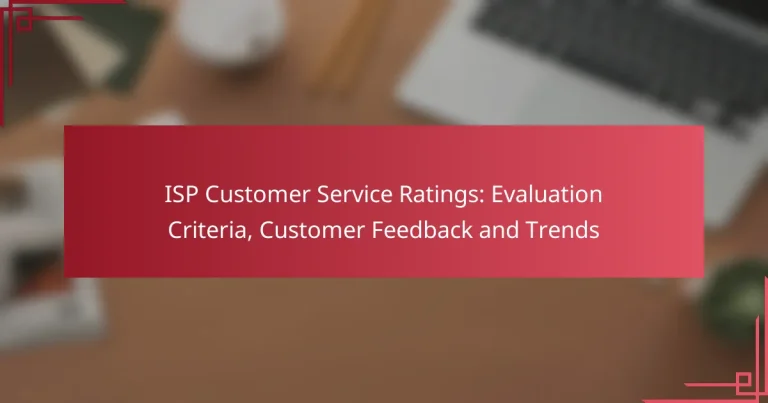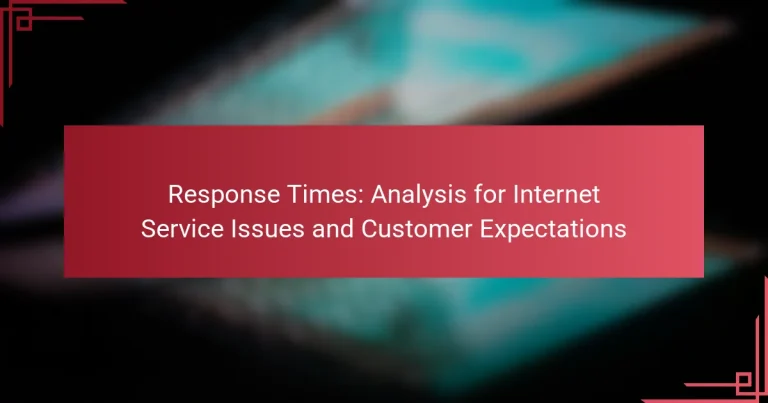Customer Reviews: Impact on ISP Choices and Decision-Making
Customer reviews play a pivotal role in shaping choices for internet service providers (ISPs) in the US, as they influence perceptions of service quality and reliability. Prospective customers often depend on the insights of others to navigate their decision-making process, making these reviews essential for selecting an ISP. Key factors such as service reliability, customer support, and pricing transparency further impact consumer preferences, highlighting the importance of evaluating the credibility and sentiment of reviews to make informed choices.

How do customer reviews influence ISP choices in the US?
Customer reviews significantly impact ISP choices in the US by shaping perceptions of service quality and reliability. Potential customers often rely on the experiences of others to guide their decision-making process, making reviews a crucial factor in selecting an internet service provider.
Trust and credibility factors
Trust and credibility are essential when evaluating customer reviews for ISPs. Reviews from verified users tend to carry more weight, as they provide authentic insights into service performance. Additionally, platforms that aggregate reviews often display ratings and feedback in a way that helps users quickly gauge overall satisfaction.
It’s important to consider the volume of reviews as well; a provider with a high number of positive reviews is generally seen as more trustworthy than one with only a few. Look for patterns in feedback, such as consistent praise or recurring complaints, to assess credibility.
Impact on customer satisfaction
Customer satisfaction is closely tied to the experiences shared in reviews. Positive reviews often highlight aspects like speed, reliability, and customer support, which can lead to higher satisfaction rates among new customers. Conversely, negative reviews can deter potential clients and signal underlying issues with service delivery.
For instance, if multiple reviews mention slow internet speeds or poor customer service, prospective customers may choose to avoid that ISP. Understanding these sentiments can help consumers make informed choices that align with their expectations for service quality.
Comparison with competitor reviews
Comparing customer reviews across different ISPs provides valuable insights into relative performance. By analyzing reviews side by side, potential customers can identify which providers excel in specific areas, such as pricing, installation speed, or technical support.
Consider creating a simple comparison chart that outlines key features and average ratings of competing ISPs. This visual aid can help clarify differences and guide decision-making, ensuring that customers select an ISP that best meets their needs based on collective feedback.

What are the key attributes of ISP customer reviews?
Key attributes of ISP customer reviews include service reliability, customer support experiences, and pricing transparency. These factors significantly influence consumer decisions when selecting an Internet Service Provider (ISP).
Service reliability ratings
Service reliability ratings reflect how consistently an ISP delivers internet access without interruptions. Customers often look for reviews that mention uptime percentages, which ideally should be above 99%, indicating minimal service outages.
When evaluating service reliability, consider user feedback on connection stability during peak hours. A reliable ISP should maintain performance even when demand is high, ensuring a smooth online experience.
Customer support experiences
Customer support experiences highlight how effectively an ISP addresses issues and inquiries. Reviews often detail response times, availability of support channels, and the overall helpfulness of the staff.
Look for ISPs with positive feedback regarding their customer service, especially those that offer 24/7 support. Quick resolution of problems can significantly enhance user satisfaction and loyalty.
Pricing transparency
Pricing transparency refers to how clearly an ISP communicates its pricing structure, including any hidden fees or promotional rates. Customers prefer ISPs that provide straightforward information about monthly costs and contract terms.
To avoid surprises, read reviews that discuss the total cost of service, including installation fees and equipment rentals. A transparent ISP will typically outline all charges upfront, allowing customers to make informed decisions.

How to evaluate ISP customer reviews effectively?
To evaluate ISP customer reviews effectively, focus on the credibility of the sources, the volume and recency of reviews, and the overall sentiment expressed. This approach helps you discern genuine feedback from biased or unreliable opinions, allowing for informed decision-making.
Identifying credible sources
Start by checking the credibility of the platforms where reviews are posted. Reputable websites like Trustpilot, Consumer Reports, and local forums often provide more reliable insights than social media or anonymous blogs. Look for reviews from verified customers to ensure authenticity.
Additionally, consider the reputation of the ISP itself. Established providers with a long history in the market are more likely to have consistent service quality, while newer companies may still be refining their offerings.
Analyzing review volume and recency
When evaluating reviews, pay attention to both the volume and recency. A high number of recent reviews can indicate current service quality, while older reviews may not reflect the ISP’s current performance. Aim for a balance of reviews from the last few months to get an accurate picture.
As a rule of thumb, look for at least several dozen reviews to ensure a representative sample. If an ISP has only a handful of reviews, it may not provide a reliable assessment of their service.
Understanding review sentiment
Review sentiment is crucial in gauging customer satisfaction. Analyze the language used in reviews to identify common themes, such as speed, reliability, and customer service. Positive reviews often highlight specific features, while negative ones may point to recurring issues.
Consider using sentiment analysis tools or simply tallying positive versus negative comments to get a quick overview. A predominance of positive feedback can indicate a trustworthy ISP, while a significant number of complaints may warrant caution.

What are the common pitfalls in interpreting ISP reviews?
Interpreting ISP reviews can be challenging due to various common pitfalls that may skew perceptions. Understanding these pitfalls helps consumers make more informed choices when selecting an internet service provider.
Overemphasis on negative reviews
Many consumers tend to focus disproportionately on negative reviews, which can lead to a skewed perspective of an ISP’s overall performance. While negative experiences are important to consider, they often represent a minority of users and may not reflect the typical service quality.
For example, if an ISP has hundreds of reviews but only a small fraction are negative, it may still provide reliable service for most customers. Balance is key; consider both positive and negative feedback to form a comprehensive view.
Ignoring context of reviews
Context is crucial when interpreting ISP reviews, as different users may have varying experiences based on their specific situations. Factors such as location, service type, and individual usage patterns can significantly influence satisfaction levels.
For instance, a user in a rural area may face different challenges compared to someone in an urban setting, even with the same ISP. Always look for details in reviews that explain the circumstances surrounding the user’s experience.
Failing to consider personal needs
When evaluating ISP reviews, it is essential to align the feedback with your own internet needs and usage habits. What works for one person may not work for another, depending on factors like streaming, gaming, or remote work requirements.
Before making a decision, identify your specific needs—such as speed, reliability, and customer support—and prioritize reviews that address those aspects. This tailored approach ensures that the ISP you choose aligns with your personal requirements.

How do geographic factors affect ISP reviews?
Geographic factors significantly influence ISP reviews by determining service availability, customer preferences, and the overall quality of internet service. These elements can vary widely across regions, impacting consumer choices and satisfaction levels.
Regional service availability
Service availability is often dictated by geographic location, with urban areas typically having more options than rural regions. In cities, multiple ISPs may compete, leading to better pricing and service packages, while rural customers might be limited to one or two providers. This disparity can heavily influence customer reviews, as users in underserved areas may express frustration over lack of choices.
When evaluating ISPs, consider local availability maps and user reviews specific to your region. Websites that aggregate customer feedback can provide insights into which ISPs are operational in your area and how they rank in terms of service quality.
Local customer preferences
Local customer preferences play a crucial role in shaping ISP reviews, as different regions may prioritize various features such as speed, reliability, or customer service. For instance, tech-savvy urban users might favor high-speed fiber connections, while rural customers may prioritize affordability and basic service reliability.
Understanding these preferences can guide potential customers in selecting an ISP that aligns with their needs. Reading reviews from local users can reveal trends and common complaints that might not be apparent in broader reviews.
Variability in service quality
Service quality can vary significantly by location, influenced by factors such as infrastructure investment and local competition. In areas with multiple ISPs, competition often drives improvements in service quality, while monopolistic environments may lead to subpar experiences.
To assess service quality, look for reviews that mention specific aspects like connection speed, downtime frequency, and customer support responsiveness. Tools that measure internet speed can also help verify claims made in reviews, providing a clearer picture of what to expect from an ISP in your area.







